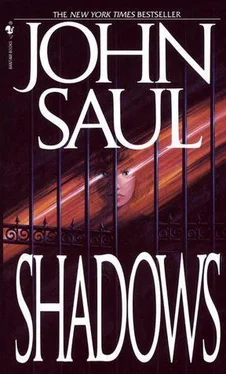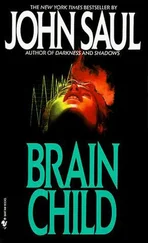“I do,” Jeanette said simply. “I have to.”
Berman seemed about to object further, then apparently changed his mind. “This way,” he said softly. He led them down a short corridor and then into an examining room. On a gurney, covered by a sheet, was the form of a body. Jeanette paused at the door, but then steeled herself. Moving across to the gurney, she hesitantly touched the cover, then gently pulled it back.
She stared into Adam’s face.
Smeared with blood, and battered by the impact of the locomotive, it was barely recognizable, and yet she knew instantly that it was her son. At last the wall she’d built inside her broke and she began sobbing. “Oh, Adam,” she whispered, the words choking in her constricted throat. “I’m so sorry, baby. I’m so sorry. Why didn’t you just come home? I would have made it right, honey. I would have taken care of you.” Her tears flowing freely, she bent down and, oblivious of the blood that still stained her son’s cheeks, gently kissed him.
Only then did she allow the doctor to cover her son’s face once again, and her husband to lead her out of the room.
A few minutes later, her hands trembling, she tried to force herself to drink a cup of scalding hot coffee while the doctor did his best to reassure her that Adam hadn’t suffered.
“He would have died instantly. Apparently he was sitting in the middle of the tracks, his back to the train. The first contact would have killed him. I’m sure he felt nothing at all.”
But the terror , Jeanette found herself thinking. How he must have felt, hearing the train thundering toward him. In her mind she heard the blast of the horn, the roar of the locomotive; she even imagined she could feel the tracks vibrating as the train rushed toward her son. She shuddered, and the coffee slopped over, staining the white terry-cloth robe she was still wearing.
Through it all, she’d never once, until that very instant, realized she’d left the house without dressing. Shakily, she put the coffee cup down. “Take me home, Chet.”
As her husband led her out of the emergency room and back to the waiting police car, grief at last began closing in on Jeanette Aldrich.
At a little after seven o’clock that morning, Steve Conners arrived at the Academy, and knew at once that something was wrong. Two police cars were pulled up in the driveway in front of the main building, and he could see Dr. Engersol’s dark blue Oldsmobile as well. Ignoring his usual morning routine of going first to his classroom in the west wing building, he parked next to one of the black-and-whites and mounted the steps to the broad loggia. As he let himself in through the front door, the first person he saw was Hildie Kramer, talking to one of the policemen. Near the foot of the stairs a knot of children whispered among themselves, their eyes wide as they watched the policeman talking to their housemother.
“What’s going on?” Steve asked as he joined Hildie.
Hildie’s eyes shot briefly toward the group of children by the stairs, but then she decided there was no point in retreating to her office. Certainly, there wasn’t a child in the house who didn’t already know what had happened. “It’s Adam Aldrich,” she said. “I’m afraid he killed himself last night.”
“Oh, Jesus,” Steve groaned. Suddenly he remembered the things he hadn’t done yesterday.
He hadn’t mentioned either to Hildie or to George Engersol his concerns about the boy. He’d intended to, but then something had come up — he couldn’t even remember what it had been right now — and the whole thing had slipped his mind.
Slipped his mind! And now Adam Aldrich was dead.
His horror at the thought must have showed clearly on his face, for Hildie was staring curiously at him. “Steve, what is it?”
Steve shook his head as if to push back the tide of guilt that was washing over him, but the gesture did no good. “I should have done something,” he said. “I knew something was wrong. I was going to talk to you about him. And George, too.”
Now the policeman’s eyes were fixed on him. “You know something about the boy?”
Steve nodded unhappily. “He’s in my English class.” Briefly, he filled in the policeman — and Hildie Kramer, too — on what had happened in his class the previous morning. “I knew he was upset about something, and I was going to talk to you about it, but it just went out of my mind. And now—”
“And now you feel as though you could have prevented it,” Hildie finished for him. Her attention shifted momentarily back to the police officer. “If you’re finished with me for now, I think I’d better have a talk with Mr. Conners.”
The officer nodded, closing his notebook. “I think I’ve got all there is to get. It doesn’t seem like anyone talked to him or heard him leave. And the note on his computer is pretty clear. If there’s anything else, I’ll call you.”
When he was gone, Hildie took Steve Conners into her office, and gestured him into a chair. “Steve, I’m not going to pretend that your forgetting to speak to me about Adam wouldn’t have made any difference. It probably would, at least in the short run. But there’s something else you’ve got to understand, or you’ll never be able to deal with this school.” She paused, as if waiting for a response from the young teacher. When there was none, she went on. “This isn’t the first time we’ve lost a student this way, and it won’t be the last. In fact, it’s one of the reasons we exist. Our students almost all have problems of one sort or another, and several of them have tried to kill themselves in the past. Adam was among them. And, of course, had you told me what happened yesterday, I would have talked to him, possibly even put him into counseling immediately. But I probably wouldn’t have put him under a twenty-four-hour watch.”
Conners frowned. “But why not? If he’d tried something like this before—”
“The last time he tried it, no one thought it was truly serious. Often — in fact most times — when children try to kill themselves, they aren’t truly serious. Most children really have no concept of death, you know. They know it exists, but only in the abstract. Most children feel immortal — they have no sense that they’re ever going to die. For a child, even growing up is something that’s barely comprehensible. So I doubt that I would have hospitalized Adam, given all the circumstances. I would have talked to Dr. E, of course, but there’s no guarantee that this wouldn’t have happened anyway. And I have to tell you that there’s no guarantee that it won’t happen to other of our students. In fact, I can almost guarantee that it will. Sad as it is, there’s no way, short of isolation of every one of them, that we can stop it entirely.” She smiled wanly. “I doubt you’d be any more in favor of locking these kids up than anyone else here is.”
Steve Conners listened to her words silently, knowing that no matter what she said, he would still feel the guilt for what had happened, perhaps for the rest of his life. He’d known the boy was in trouble, but done nothing about it.
Because it had slipped his mind.
Slipped his mind!
And now there was nothing he could do about it, nothing he could do to put the situation right, nothing he could do to bring Adam back to life.
Except see to it that from now on he kept a better eye on the kids, never again failed to act if he saw that one of them was in trouble.
But even as he made his silent oath, he knew that it still wouldn’t be enough.
No matter what he might do, it wouldn’t assuage the guilt he felt over the death of Adam Aldrich.
“Josh?”
Читать дальше












